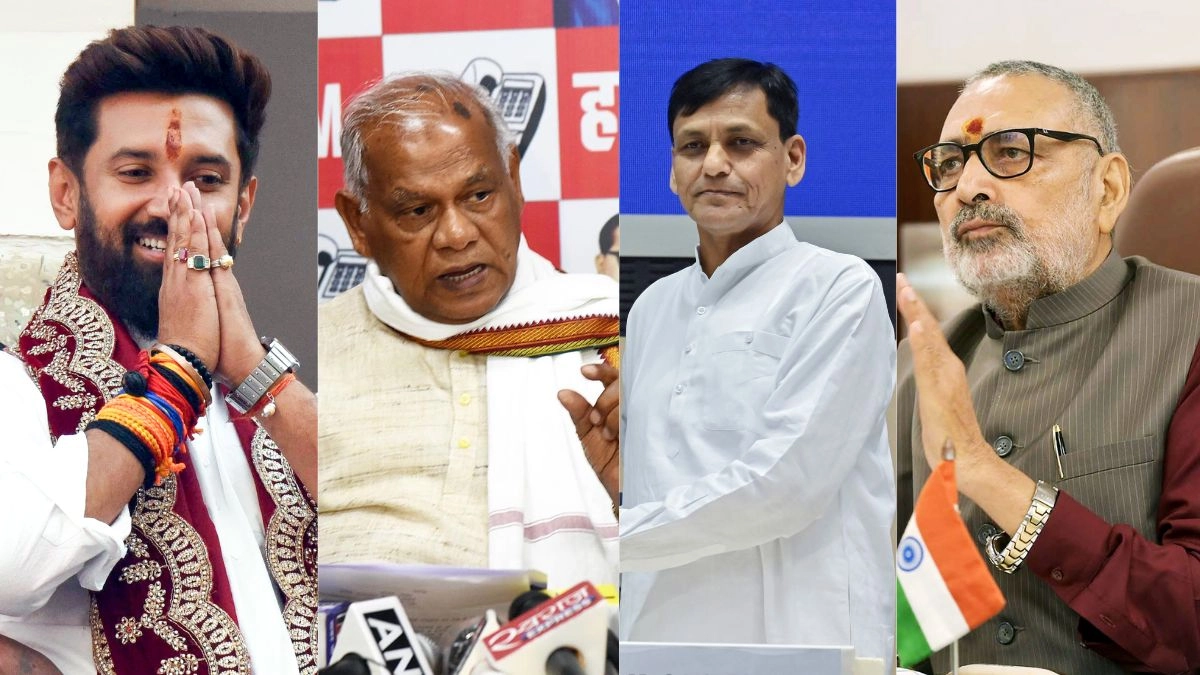- By Vivek Raj
- Wed, 12 Jun 2024 12:50 PM (IST)
- Source:JND
Modi 3.0: Nearly a week after the BJP-led National Democratic Alliance (NDA) retained its power at the Centre, Narendra Modi on Sunday took oath as the prime minister of India again along with 71 MPs from BJP and its allies including TDP, JDU, LJP, HAM, JDS among others. PM Modi's ministers' team has 30 Cabinet ministers, five Ministers of State with Independent charge and 36 Ministers of State. While most of the key cabinet ministers in the third Narendra Modi-led government have retained the portfolios they held previously, there are some new faces included in the cabinet which are seemingly aimed at maintaining the equation with NDA partners, given the upcoming Assembly Elections in several states.
One such state is Bihar, where Assembly Elections are due next year and the political scenarios in the state have evolved to a much larger extent since Nitish Kumar's double flip-flop within a year. Nitish Kumar-led JD(U) has also emerged as one of the kingmakers after winning 12 seats in the recently concluded Lok Sabha Election 2024, where BJP failed to reach the majority mark on its own. JD(U)'s "unconditional support" to BJP in forming the NDA government, has resulted in an increase in the share of leaders from the state in the Modi Cabinet 3.0. Eight parliamentarians from Bihar, four from the BJP and four from alliance partners, have been inducted into the Cabinet. A look at the names gives an idea of the caste calculations made by the BJP while selecting the leaders.
Bihar BJP leaders in Modi's Cabinet include:
i) Nityanand Rai - a Yadav leader from Ujiarpur and former MoS for Home Affairs
ii) Giriraj Singh - a Bhumihar leader from Begusarai and former Rural Development Minister
iii) Satish Chandra Dubey - a Rajya Sabha member and a prominent Brahmin face of the BJP in Champaran
iv) Raj Bhushan Chaudhary - A political newcomer from the Mallah (fishermen) community in Muzaffarpur. He defeated BJP turncoat and prominent Nishad leader Ajay Nishad.
Leaders From NDA Allies Inducted In Modi 3.0:
i) Jitan Ram Manjhi (HAM): Former chief minister from the Mahadalit Musahar community.
ii) Chirag Paswan (LJP): Son of the late Ramvilas Paswan and a notable Dalit leader.
iii) Ramnath Thakur (JDU): Son of Bharat Ratna Karpoori Thakur, an iconic leader of the Economically Backward Classes (EBCs).
iv) Rajiv Ranjan Singh alias Lalan Singh (JDU): Former party president is a trusted lieutenant of Bihar CM Nitish Kumar and comes from the dominant Bhumihar caste.
Why BJP Is Focussing On Caste Equations
As the Bihar Assembly elections draw near, the inclusion of several prominent leaders from Bihar in the Modi 3.0 Cabinet highlights the BJP's strategy to accommodate its NDA allies while focusing on the political mobilisation of votes from the Extremely Backward Castes (EBCs) and Dalits, the two key demographics in Bihar's political landscape. The importance of EBCs as a significant voting block in Bihar has increased following the recent caste survey by the state government.
The survey revealed that EBCs, combined with Other Backward Classes (OBCs), constitute 63 per cent of Bihar's population. When including Dalits and Adivasis, this figure rises to nearly 85 per cent. This demographic reality has fueled the "85 vs 15" narrative (backwards vs forward) that has been a central theme in Bihar's caste politics since the 1980s. Therefore, the appointment of EBC and Dalit leaders in the Modi government for 2024 is seen as a strategic move to shape the agenda for the Bihar Assembly elections in 2025.
The Tejashwi Effect
Following the Mandal politics era, there was a notable dominance of the Yadav community, which has been termed as "Yadavisation", in backward caste politics under Lalu Prasad Yadav's leadership. With changing times, his son and political successor, Tejashwi Yadav is making efforts to diverge from this trend in order to improve the political inclusion of other marginalised castes. Tejashwi's strategy includes fielding non-Yadav OBC candidates, particularly from the Kushwaha community. His campaign for the 2024 elections saw a notable alliance with Mukesh Sahani, the Nishad leader and chief of the Vikassheel Insaan Party (VIP), in a bid to reach out to EBCs.
ALSO READ: Chandrababu Naidu Takes Oath As Andhra Pradesh CM; Pawan Kalyan, Nara Lokesh Sworn In As Ministers
Additionally, there are indications that the BJP may be grooming Chirag Paswan to challenge the rising influence of Tejashwi Yadav in the Bihar Assembly. Chirag, who has been involved in central politics, possesses appeal as a young and progressive leader with support from the Paswan community. This could pose a strong challenge to Tejashwi Yadav, who also emerges as a new-age leader, advocating for jobs, employment, and cross-caste alliances, moving away from the traditional "Yadavisation" of caste politics.
